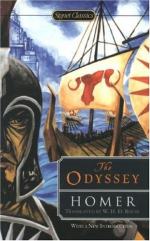INTRODUCTION
Composition and plot of the Odyssey.
The Odyssey is generally supposed to be somewhat the later in date of the two most ancient Greek poems which are concerned with the events and consequences of the Trojan war. As to the actual history of that war, it may be said that nothing is known. We may conjecture that some contest between peoples of more or less kindred stocks, who occupied the isles and the eastern and western shores of the Aegean, left a strong impression on the popular fancy. Round the memories of this contest would gather many older legends, myths, and stories, not peculiarly Greek or even ‘Aryan,’ which previously floated unattached, or were connected with heroes whose fame was swallowed up by that of a newer generation. It would be the work of minstrels, priests, and poets, as the national spirit grew conscious of itself, to shape all these materials into a definite body of tradition. This is the rule of development—first scattered stories, then the union of these into a national legend. The growth of later national legends, which we are able to trace, historically, has generally come about in this fashion. To take the best known example, we are able to compare the real history of Charlemagne with the old epic poems on his life and exploits. In these poems we find that facts are strangely exaggerated, and distorted; that purely fanciful additions are made to the true records, that the more striking events of earlier history are crowded into the legend of Charles, that mere fairy tales, current among African as well as European peoples, are transmuted into false history, and that the anonymous characters of fairy tales are converted into historical personages. We can also watch the process by which feigned genealogies were constructed, which connected the princely houses of France with the imaginary heroes of the epics. The conclusion is that the poetical history of Charlemagne has only the faintest relations to the true history. And we are justified in supposing that, quite as little of the real history of events can be extracted from the tale of Troy, as from the Chansons de Geste.
By the time the Odyssey was composed, it is certain that a poet had before him a well-arranged mass of legends and traditions from which he might select his materials. The author of the Iliad has an extremely full and curiously consistent knowledge of the local traditions of Greece, the memories which were cherished by Thebans, Pylians, people of Mycenae, of Argos, and so on. The Iliad and the Odyssey assume this knowledge in the hearers of the poems, and take for granted some acquaintance with other legends, as with the story of the Argonautic Expedition. Now that story itself is a tissue of popular tales,—still current in many distant lands,—but all woven by the Greek genius into the history of Iason.




